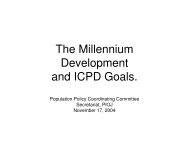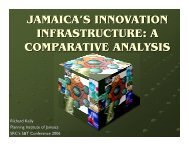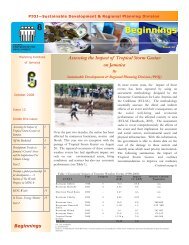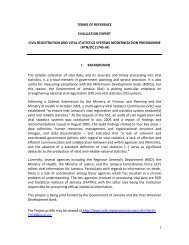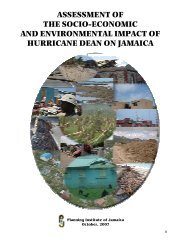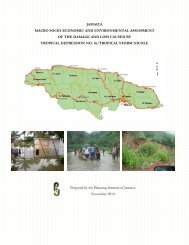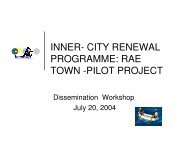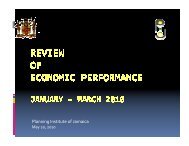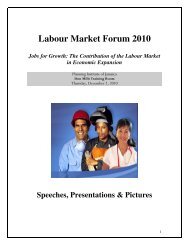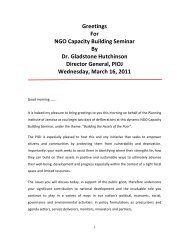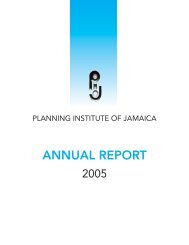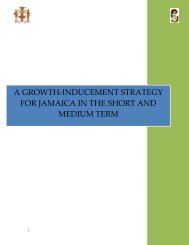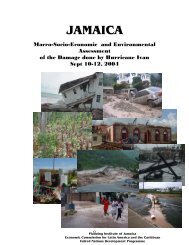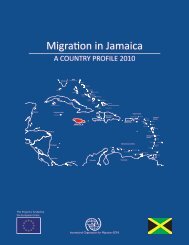The Planning Institute of Jamaica (PIOJ)
The Planning Institute of Jamaica (PIOJ)
The Planning Institute of Jamaica (PIOJ)
You also want an ePaper? Increase the reach of your titles
YUMPU automatically turns print PDFs into web optimized ePapers that Google loves.
<strong>The</strong> <strong>Planning</strong> <strong>Institute</strong> <strong>of</strong> <strong>Jamaica</strong><br />
(<strong>PIOJ</strong>)<br />
‘Lift Self, Lift Yaad’<br />
<strong>The</strong> EAGLES BREAKAWAY CONFERENCE 2006<br />
By<br />
Dr. Wesley Hughes,<br />
Director General<br />
Thursday, April 20, 2006
I am grateful for this opportunity to speak to an audience <strong>of</strong> young people<br />
because you are the future. As Director General <strong>of</strong> the <strong>PIOJ</strong>, my job is always<br />
about the future. <strong>Planning</strong> is essentially about the future. If you are not<br />
concerned about the future, you need not plan.<br />
Things may not always turn out the way you plan them, but that is why it is even<br />
more important to plan and make allowances for things that may not go<br />
according to plan. For example, we at the <strong>PIOJ</strong> expect the economy to grow in<br />
2006. We expect real GDP to be approximately 3.1% higher than for 2005. We<br />
expect the services sector, in particular, to perform well. Our outlook for the year<br />
is positive.<br />
If, however, we did not plan, how would we compare trends and determine how<br />
well or how poorly the economy performed? How would we set targets? How<br />
would we envision the better future that we want to attain?<br />
I know you are concerned about your future and that <strong>of</strong> your country which is why<br />
you are studying or plan to study further. As young people a constant question<br />
that you should have at the forefront is: ‘How can I contribute to my country’s<br />
development?’ How can I make the future better and brighter?’<br />
<strong>The</strong> rapidly changing environment is making it very difficult to answer these<br />
questions definitively. Part <strong>of</strong> the problem is the fact that many <strong>of</strong> our youth feel<br />
1
alienated or disconnected from society. Youth <strong>of</strong>ten feel that not enough is being<br />
done by the system for them or with them. <strong>The</strong>re are mounting problems being<br />
faced by all societies as we come to terms with the rapid pace <strong>of</strong> globalization<br />
which is making life quite tentative. Many <strong>of</strong> the things we were certain about in<br />
the past are no longer so. Some jobs, and even whole industries, are<br />
disappearing; new technologies are emerging all the time. <strong>The</strong>se are <strong>of</strong>ten being<br />
used to, not only enhance efficiency and national competitiveness but also,<br />
sometimes, to destroy the environment and a way <strong>of</strong> life.<br />
<strong>The</strong> outcome <strong>of</strong> globalization and technological advancement is not all negative.<br />
<strong>The</strong>re are new and real opportunities being created even as old one ones<br />
disappear. This is what the German Economist Joseph Schumpeter called<br />
“creative destruction.” It is similar to a developer buying an old house and<br />
destroying it to build a new structure. As I drive around the city, I see a lot <strong>of</strong> this<br />
type <strong>of</strong> construction and development taking place. If we focus only on the<br />
destruction <strong>of</strong> the old building we will have a negative or pessimistic outlook.<br />
However, if we move beyond the rubble <strong>of</strong> the old building and focus on the new<br />
structure, our outlook will be much more positive. While we need to be concerned<br />
about the problems we face, about the impact <strong>of</strong> globalization and other<br />
negatives, my duty as Head <strong>of</strong> the <strong>Planning</strong> <strong>Institute</strong> and you as young people<br />
looking to the future, must be to create solutions that will make life better.<br />
Remember that a positive outlook will eventually win out.<br />
2
We have to plan and execute at the local and community level in dealing with<br />
many <strong>of</strong> our problems. While we must insist on the state playing its legitimate<br />
roles, many initiatives can be taken at the micro or community level to make life<br />
better.<br />
At the macro level a lot <strong>of</strong> resources are spent on education in <strong>Jamaica</strong>. <strong>The</strong><br />
education system caters to about 800,000 students in both the public and private<br />
sectors at all levels: early childhood, primary, secondary and tertiary levels.<br />
<strong>The</strong>re are over 22,000 teachers employed in over 1,000 institutions. Government<br />
spends over $30 billion on education each year and households spend an<br />
additional $19 billion. This is a very large commitment and the truth is, it is not<br />
seen as enough. More is needed for us to build a world class education and<br />
training system. Currently, the Government is working towards the goal <strong>of</strong><br />
eliminating shift schools and providing more school spaces for students to<br />
alleviate overcrowding in schools by September 2007. Early childhood education<br />
has moved from 4.4% <strong>of</strong> the Education Ministry’s budget in 2003 to<br />
approximately 8%.<br />
But, more does not necessarily mean money. What is <strong>of</strong>ten needed is more<br />
creativity and imagination in how we spend or use what we have. We do not<br />
have unlimited financial resources so we have to be innovative with what we<br />
have and plan wisely.<br />
3
This conference is an important micro level initiative in planning for youth<br />
development as it asserts the role <strong>of</strong> education in personal and social<br />
development and mobilization. It presents education as a tool for value-added<br />
development which is something that I think is worthy <strong>of</strong> support. <strong>The</strong> strategy<br />
brings tertiary-level students to share their experiences and advice with<br />
secondary-level students; this is valuable. We have organizations here in<br />
<strong>Jamaica</strong>, such as 4E (Eager for Education, Employment and Earnings) 1 which<br />
give scholarships for SAT classes and which assist potential university students<br />
from <strong>Jamaica</strong> to find colleges in the United States.<br />
This conference is motivational in that students return and give back to their<br />
younger counterparts by helping to motivate them to be high achievers; not just<br />
to receive college <strong>of</strong>fers <strong>of</strong> admission but also attractive financial aid packages.<br />
<strong>The</strong>se students are providing a value-added service to <strong>Jamaica</strong> that cannot be<br />
quantified in financial terms but may be compared to the building <strong>of</strong> social capital.<br />
I particularly admire the objective to ‘help <strong>Jamaica</strong>n students (especially those<br />
studying overseas) to discover the areas in which their contribution to the<br />
recasting <strong>of</strong> <strong>Jamaica</strong>’s social fabric and economic structure is needed and<br />
present avenues through which it can be achieved.’ <strong>The</strong> Caribbean has a high<br />
level <strong>of</strong> outward migration which poses a challenge for our development. It is up<br />
1 4E has operated in the United States for the past 19 years but only began operations in <strong>Jamaica</strong> in October<br />
2002.<br />
4
to us, as planners, the policy makers and you, to come up with creative solutions<br />
to this challenge.<br />
As globalization evolves, the movement <strong>of</strong> labour across the globe will become a<br />
common feature <strong>of</strong> economies. <strong>Jamaica</strong>, like most countries will require many<br />
new skilled workers, some in areas we cannot even imagine at this point. We<br />
know however, that there are many areas in which people will be needed: health<br />
workers to treat the elderly, educators and trainers, technicians, personal care<br />
givers, computer specialists, accountants, auditors, creative workers,<br />
entertainers, etc. <strong>The</strong>se are areas that we can take advantage <strong>of</strong> to train large<br />
numbers <strong>of</strong> our people knowing full well that some will travel abroad. This is an<br />
opportunity to educate and train people for both local employment and for the<br />
export <strong>of</strong> labour services.<br />
This is a personal message to those <strong>of</strong> you that are already at the tertiary level to<br />
assess and evaluate the skills which the country and the world need, and see<br />
how you can contribute to filling the gap.<br />
Those <strong>of</strong> you who are at the secondary level need to be reminded how important<br />
academic performance is. <strong>The</strong>re’s no room for mediocrity in a modern society, if<br />
you can’t meet the global standards as an individual or as a society you will be<br />
left behind. Globalization is creating winners and losers. <strong>The</strong> winners are those<br />
who are educated and trained to find jobs in areas that are producing goods and<br />
5
services that the world demands. <strong>The</strong> losers are those who find themselves in<br />
industries whose products are not needed and workers who cannot be trained.<br />
You have to ask yourselves from now if you want to be winners or losers.<br />
<strong>The</strong>re are many things out there to detract students: much more than during my<br />
teenage years. But, alternately, there is much more out there to motivate you<br />
than what I was exposed to during my young years.<br />
Information and technology is at your fingertips. You are global citizens,<br />
interacting in the knowledge society, even if you never leave <strong>Jamaica</strong>’s borders<br />
because you can speak to someone on the other side <strong>of</strong> the globe just as easily<br />
as you can speak to the person right next to you. You can research any topic<br />
without even leaving your home or school, once you have access to the internet,<br />
as there are virtual libraries. Your future is full <strong>of</strong> possibilities: possibilities that<br />
you cannot imagine as yet; possibilities that you may create or assist in creating.<br />
Your future is in your hands, literally.<br />
Over the past decade, and in particular the past five years, the Government <strong>of</strong><br />
<strong>Jamaica</strong> has sought to institutionalize the concerns <strong>of</strong> youth through a number <strong>of</strong><br />
strategies.<br />
• the National Youth Service’s Corps Programme;<br />
• the National Centre for Youth Development (NCYD);<br />
• the National Strategic Plan for Youth Development;<br />
6
• the revised National Youth Policy;<br />
• the National Youth Link-Up Programme;<br />
• Operation Phoenix and Youth Information Centres (YIC);<br />
• the <strong>Jamaica</strong> Values and Attitudes Programme for Tertiary Students<br />
(JAMVAT);<br />
• the National Summer Employment Programme.<br />
<strong>The</strong>re are many other initiatives that I have not mentioned. However, my<br />
objective is to inform those who don’t already know <strong>of</strong> the opportunities that are<br />
available in <strong>Jamaica</strong> to youth.<br />
<strong>The</strong> theme <strong>of</strong> this conference: ‘Lift Self, Lift Yaad,’ is about identity building<br />
among youth. “Self” is each <strong>of</strong> you here today and all the other youth who are<br />
elsewhere in <strong>Jamaica</strong>. “Yaad” is <strong>Jamaica</strong>. <strong>The</strong>refore, if we want to lift this<br />
country, <strong>Jamaica</strong>, it has to begin with each <strong>of</strong> us. We have to lift ourselves to lift<br />
our country. We have to improve our literacy levels. We have to improve our<br />
CSEC passes, especially in English Language and Math. We have to make<br />
ourselves employable. Money is being spent on Education. We need to<br />
demonstrate that it is being effectively spent and lift our standards.<br />
We have to empower ourselves if our country is to be empowered. You, our<br />
youth, are especially vital to <strong>Jamaica</strong>’s future. If you are not going anywhere,<br />
neither is <strong>Jamaica</strong>. A country without youth has nowhere to go! Lift ‘self’ and<br />
‘yaad’ will be elevated.<br />
7



